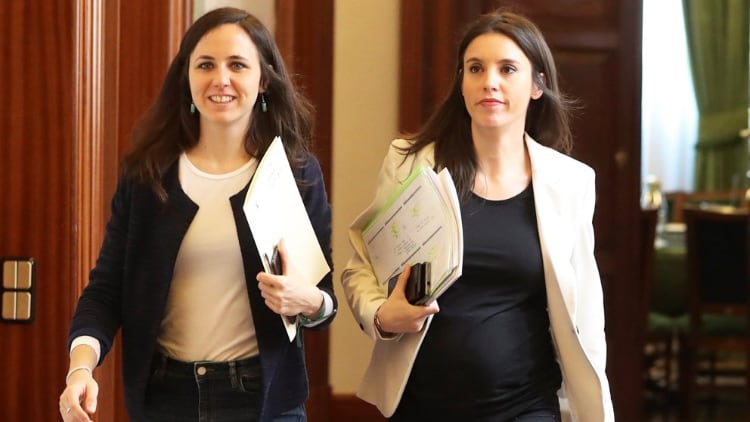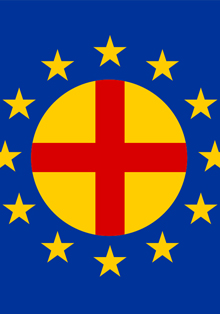Ángel Collado
The war in Ukraine also leaves evidence, this time in foreign policy, of the dysfunctions of the “Frankenstein government” presided over by Pedro Sánchez due to the conglomerate of parties and groups that make up or support it.
The government is divided between socialists who, albeit in tow, support the Western Ukrainian cause, far-left populists who remain silent, and communists who directly campaign against sending arms to Zelenski.
Sánchez began by rejecting the delivery of Spanish military equipment to Ukraine and 36 hours later approved the opposite without any explanation beyond the obvious fact that he had been lagging behind other European leaders for days. Most of his 22 vice-presidents and ministers were fine with this, but the five communist or populist and far-left cabinet members were faced with the problem of consistency with their pacifist and anti-NATO convictions.
Spain’s pro-Western and pro-European position in the conflict is safeguarded in parliament by the main opposition party, the PP, which counterbalances the weaknesses of the social-communist executive with its deputies. Even the extreme right-wing Vox has this time put aside its Euroscepticism in the face of Putin’s aggression. Santiago Abascal’s party supports the arms shipment, but instead of encouraging the government to fulfil its obligations, it demands its resignation.
Against the clear majority in the Spanish Cortes in favour of Europe’s solidarity with Ukraine’s defence, a minority has emerged that turns out to be key in the composition of the government. In a Congress with 350 members, Podemos, with its various brands, contributes 35 deputies to Sánchez’s parliamentary support base (the PSOE’s 120), while the Catalan and Basque pro-independence parties collaborate with their 18 deputies, which are essential for the Executive to pass its laws.
In any case, and in case the development of the war in Ukraine makes a greater involvement of the Spanish Armed Forces in Eastern Europe necessary, Sánchez is guaranteed a minimum two-thirds majority in Congress to approve it thanks to the backing of the centre-right (100 MPs) despite the foreseeable withdrawal of his communist and separatist allies on the far left: ERC and Bildu. Another thing is the internal stability of the Cabinet, its external image and the deterioration of the trust of its allies in the face of a prime minister who, in his Council of Ministers, is dealing with defenders of the equidistance between the West and Putin.
Sánchez hoped that the upcoming NATO summit that Spain will host in June would help him gain positions in the Alliance and improve his personal image in foreign policy despite the aforementioned hindrance of having communist ministers. The invasion of Ukraine now leaves him little room for balancing with his partners.
Until now, official pacifism in Spain has been handled directly by the PSOE. After the massive “no to war” campaign that united the entire left against the PP government in 2003 over the Iraq war, the socialist José Luis Rodríguez Zapatero won the elections and then got Spain into the war in Afghanistan with no more opposition on the streets than the almost anecdotal opposition of the Izquierda Unida communists.
Now two of Sánchez’s ministers, Irene Montero and Ione Belarra, Pablo Iglesias’s successors in the Podemos leadership, have come out in opposition to the delivery of arms to Ukraine. They consider this to be a “mistake” by the president of the government as well as an “ineffective” measure to stop the war. In addition to the “no to war” they want to cultivate, they are nostalgic for the time when the Spanish communists, between the Atlantic Alliance and the USSR, opted for the “non-alienated” countries.
The secretary general of the Communist Party of Spain, Enrique Santiago, who is also part of Sánchez’s government as secretary of state, goes further and is equidistant or sympathetic to the invasion because it is a “strategic issue”. He also believes that arming the Ukrainians “is of no use”.
To make matters more divisive, vice-president Yolanda Díaz, who aspires to head a ‘broad front’ of the left in the next elections to compete with the PSOE, dissociates herself from Podemos’ official opposition. She comes from the orbit of the PCE, but wants to be a more general reference point than Podemos for the whole “progressive” spectrum. In her personal career, it does not yet suit him to go against Sánchez or to lag behind the EU’s decisions against Putin.
For the moment, the spectacle continues in the government, and while two Podemos ministers campaign against the delivery of arms to Ukraine, the head of Defence, Margarita Robles, boasts of making the shipments and details the supply of anti-tank grenade launchers and ammunition to save Spain’s face in NATO and the EU.







